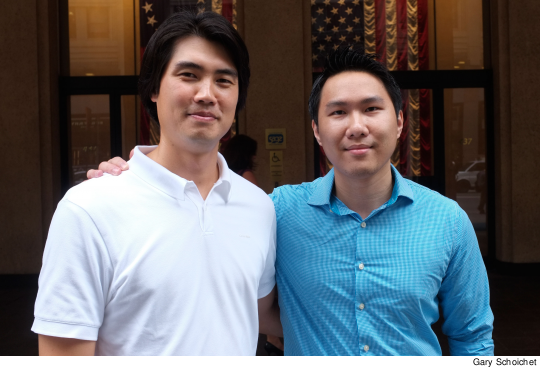In 2011, $383 million flowed into CUNY from public and private grants secured by CUNY faculty and staff. These grants, vital to the life of the University, are administered by the professional staff at the CUNY Research Foundation (RF-CUNY) Central Office, who coordinate the disbursement of funds and maintain the payroll for grant-funded employees.
The RF Central Office staff have been PSC members since 1974, and their bargaining unit has 95 members. They are now in negotiations for a new union contract. With their current three-year contract set to expire on December 31, 2012, the first round of talks for a successor agreement took place September 27, 2012. Clarion spoke with Thomas Kim and Abel Guan of the RF-Central Office bargaining team about what they hope to gain in this round of bargaining and how they plan to achieve it.
 |
Clarion: What are some of the issues in this round of bargaining?
Thomas Kim: So far we have made non-economic demands, the most important of which involve our leave time. One key issue is that we want to be able to use our sick days to take care of a sick child or family member.
Abel Guan: We discussed this with our members and everyone has circumstances outside of the workplace that require them to take time off to care for others. Why shouldn’t you have the ability to take the day off to make sure that your spouse or family members are okay?
Clarion: What about economic issues?
Guan: We expect management to make an economic proposal soon. We certainly believe our members deserve a fair pay increase and should be able to maintain their current level of health coverage while minimizing any increase in employee contributions to health insurance premiums.
Kim: Our workloads are growing. There’s a lot more to manage, a lot more to do. Management has to realize that as we grow, you’ve got to give back to the employees.
We’re committed to providing the best support we can to grant recipients, and a good contract will help us do that.
Clarion: You’re both new members of the union bargaining team. How did it feel to sit for the first time at the bargaining table across from management?
Kim: It felt good. There was a lot of anticipation building toward this moment. It’s nice to finally get the process moving.
Clarion: What led you to become a member of your chapter’s bargaining team?
Guan: This is my first time being so involved with the union. When I started learning more about our union and the contract we have, I realized that being more involved could really help my fellow workers. When it came time to select department reps, everybody came to me and said, “We want to nominate you. You are a great speaker, you will represent us well.” I was a little surprised, though I thought my experience as a board member at my condominium might come in handy.
Kim: My name got thrown out there after I asked a lot of questions at union meetings and got really curious about the whole process of collective bargaining. This is the first time I’ve been in a union and the self-empowerment we have is nice. I’ve previously worked in corporate environments where policy was dictated and workers did not have a voice.
My dad was in a union, with the electrical engineers in Brooklyn, and I’ve been leaning toward the more activist side of politics. So, it’s great to be able to act on that. If I didn’t believe in the union, I wouldn’t be here.
Clarion: What advice did your father give you, when you told him you were on the union bargaining team?
Kim: He said you’ve got to stay strong on your positions. You have to give a good fight and be vocal about it. And when the time comes, we’ll have to organize rallies and other ways for the employees’ voices to be heard, whether that’s shouting or making picket signs or handing out leaflets.
Clarion: The RF serves CUNY, but since it is technically a separate, private entity, you can go on strike, something that public-sector workers are prohibited from doing in New York State by the Taylor Law.
Kim: Knowing that we can go on strike is an important option to have. It’s one that’s going to be in our back pocket if it comes to that. We hope to settle without strife, but we are prepared to fight.
Clarion: In the RF Central Office, people like Tony Dixon and Dawn Sievers have been longtime leaders and served on the bargaining team several times in the past. In this contract round, the talks and the chapter’s contract campaign are being led by younger chapter members like yourselves. What has been your relationship to these older veterans?
Guan: We have a great relationship. We go to them for advice every day to talk about strategy for how to get the best contract for our members.
Kim: Dawn gave me her binder from the last contract negotiations. It has just been a wealth of information, with a timeline and detailed notes on everything from how management reacted to their proposals to when stalemates occurred to when to give updates and get everyone involved. It’s given me a general overview of what to expect.
Clarion: How do you plan to communicate with members about the negotiations?
Kim: We’ll do it the old-fashioned way – just walk around the office and get the word out person-to-person, as well as by e-mail, the website and Facebook.
Clarion: What’s the key thing for winning a good contract?
Kim: Our work affects the whole university, and it’s important for the entire PSC to be aware of what’s going on at the Research Foundation. When the time comes, we may need other union members’ support to get a fair contract concluded.
______________________________
RELATED COVERAGE:
RF-CUNY Workers Win New Contract: Strike Deadline Yields Gains (Jan. 2010, Clarion)

